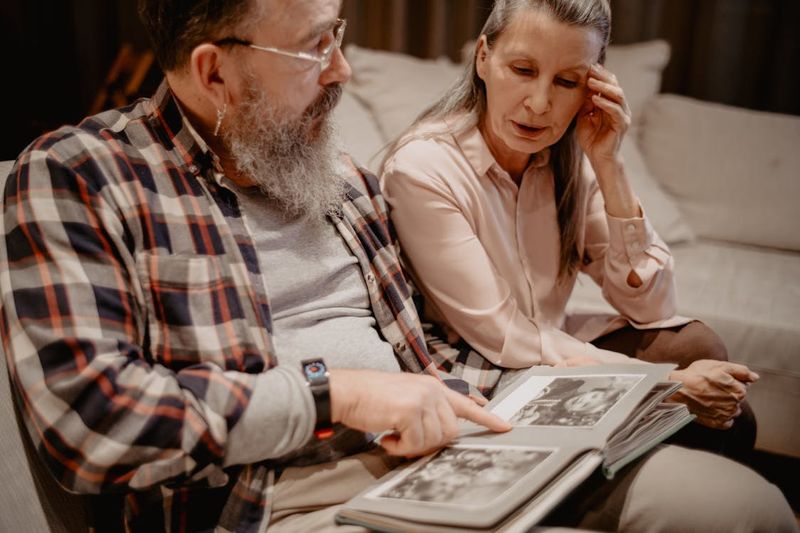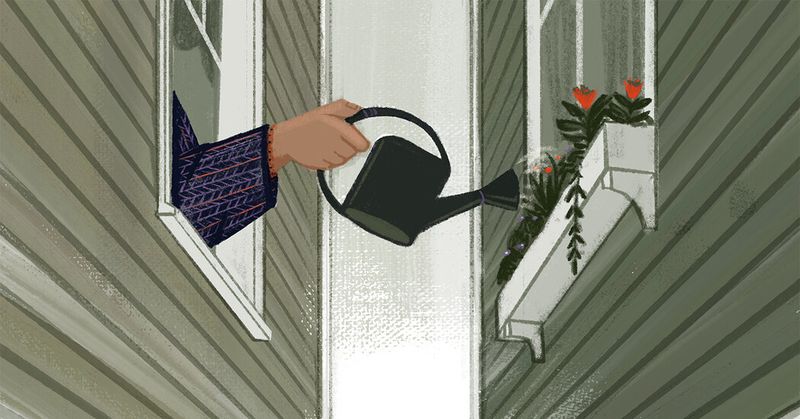18 Signs You’re Stuck In A Marriage You No Longer Recognize: A Guide For Older Adults
Marriage can be a beautiful journey, but sometimes the path changes, leaving partners feeling lost in a relationship that no longer feels familiar. For older adults, this realization can be both unsettling and isolating.
This guide explores the subtle yet profound signs that may indicate your marriage isn’t what it once was. It’s not about blame or failure; it’s about understanding the quiet shifts that can occur when lives intertwine over decades.
Recognizing these signs can be the first step to rekindling a connection or finding peace in change. With honesty and empathy, we delve into eighteen signs that your marriage might need a closer look.
1. Conversations feel like transactions

Daily conversations should feel engaging and warm, but sometimes, they start to resemble business exchanges. You go through the motions, discussing chores, finances, or schedules without genuine interest. The warmth and spontaneity have faded, leaving behind routine and necessity.
It’s easy to slip into this pattern after years together, where the focus shifts more to logistics than meaningful connection. When conversations become purely functional, the emotional distance grows.
The absence of heartfelt dialogue can be a subtle sign of drifting apart. It’s crucial to pause and attempt to inject curiosity and care back into the discussions. Even small efforts, like asking about each other’s day, can rejuvenate lost intimacy. Without this, the marriage may feel more like a partnership of convenience rather than a nurturing relationship.
2. You feel lonelier with them than when you’re alone

There’s a unique kind of loneliness that settles in when you’re with someone but feel utterly alone. It’s a paradox that many in long-term marriages experience. Being beside your partner, yet feeling like separate worlds, can be profoundly isolating.
This loneliness often stems from a lack of emotional connection. You might share a space, but not your thoughts, dreams, or concerns. When silence becomes more common than shared laughter or meaningful conversation, loneliness creeps in.
Breaking this cycle requires effort and vulnerability from both partners. Open communication and honest reflection on what led to this disconnect can help. Seeking shared activities or interests might reignite the lost bond. Otherwise, the solitude felt in each other’s presence can become more suffocating than being truly alone.
3. Eye contact has disappeared from daily life

The absence of eye contact can speak volumes about the state of a relationship. Once, looking into each other’s eyes might have been a source of comfort and connection, but now it feels like an unfamiliar act.
This loss can signify deeper emotional disconnection. Eye contact is a powerful form of communication, conveying empathy, interest, and affection. Its disappearance can leave one feeling invisible and misunderstood.
Re-establishing this simple yet profound connection can be challenging. It’s not just about looking but truly seeing each other again. Taking small steps like sharing a quiet moment or discussing a cherished memory can gradually bridge this gap, rekindling the warmth that once lived in your gaze.
4. You can’t remember the last time you laughed together

Laughter is often described as the glue that holds relationships together. When humor and joy vanish, the silence can be deafening. If you struggle to recall the last time you genuinely laughed together, it might indicate deeper issues.
Laughter fosters connection, easing tensions and bridging emotional distances. Its absence may point to a routine devoid of joy or shared interests. Without laughter, even small conflicts can feel monumental.
Rediscovering shared joy doesn’t demand grand gestures. It can start with simple acts like revisiting old jokes, watching a comedy, or reminiscing about funny past events. These small steps can slowly rekindle the joy and laughter that once filled your home, creating space for love and connection again.
5. You’re always reminiscing—never dreaming

Nostalgia can be comforting, but when your conversations are only about the past, it can signal stagnation. Reflecting on memories is natural, but if dreaming about the future has ceased, it might suggest a lack of shared goals or hope.
Living solely in the past can prevent growth and renewal in a relationship. It may indicate that the present feels unfulfilling or that the future seems uncertain.
Creating new dreams requires effort and a willingness to explore what still excites you both. Planning a trip, picking up a new hobby together, or discussing future aspirations can rejuvenate the relationship. When the balance between past reflection and future ambition is restored, the marriage can become a space for growth once more.
6. Physical touch feels awkward or forced

Physical touch is a fundamental expression of love and connection. When it begins to feel awkward or forced, it can be unsettling. What was once second nature now feels like a chore or an obligation, revealing underlying emotional rifts.
This discomfort often arises from unresolved conflicts or emotional distance. It’s not uncommon for couples to slowly drift apart in intimacy without realizing it.
Reconnecting physically requires patience and gentle attempts to reintroduce touch in a way that feels natural and comforting. Simple gestures like holding hands or a warm embrace can gradually rebuild the sense of closeness. It’s about rediscovering the comfort and affection that touch once brought to the relationship.
7. You stop fighting—not because you’re happy, but because you’re tired

Arguments can be a sign of a healthy relationship, showing that both parties care enough to express their feelings. When the fights stop, it may not be peace that has settled but exhaustion. The silence can be more indicative of resignation than contentment.
Over time, discussing the same issues without resolution can lead to emotional fatigue. The desire to avoid confrontation outweighs the need to address problems, and so, silence prevails.
Finding the energy to re-engage requires recognizing the significance of open dialogue. Reassessing what truly matters and approaching conversations with empathy can revitalize the relationship. Breaking the silence can lead to understanding and healing, rather than accepting disconnection.
8. You fantasize about life alone—and it brings relief, not guilt

Imagining life without your partner is a natural curiosity, but when these fantasies bring relief rather than guilt, it might suggest dissatisfaction. It signals a deep yearning for freedom or a different path, highlighting unmet needs within the marriage.
These thoughts often arise when the relationship feels like more of a burden than a blessing. It’s not about wishing harm to your partner, but seeking an escape from feeling trapped or unfulfilled.
Acknowledging these feelings can be the first step toward addressing underlying issues. Open discussions about personal needs and desires can lead to mutual understanding. Whether it’s finding more independence within the relationship or making difficult decisions, these fantasies can guide meaningful change.
9. You walk on eggshells over small things

Feeling on edge and cautious about every word or action is exhausting. When small, seemingly insignificant things create tension, it reveals a fragile foundation. The fear of upsetting your partner overshadows genuine interaction, leading to constant anxiety.
This dynamic often stems from past arguments or misunderstandings that were never fully resolved, leaving a lingering unease. It creates a barrier to honest communication and emotional safety.
Breaking this cycle requires rebuilding trust and understanding. It means learning to communicate without fear and addressing the root causes of the tension. With patience and empathy, the relationship can transform, moving from a space of caution to one of comfort and openness.
10. You’ve stopped sharing your inner world

In intimate relationships, sharing thoughts and feelings is key to connection. When you stop sharing your inner world, it signifies a retreat into isolation. It becomes easier to keep feelings hidden than to risk exposure or misunderstanding.
This withdrawal often results from feeling unheard or dismissed in past interactions. Over time, the fear of vulnerability overshadows the desire for closeness.
Reopening this channel requires courage and trust. Starting with small, safe topics can pave the way for deeper, more meaningful exchanges. Creating a supportive environment where both partners feel valued and heard can renew emotional intimacy, fostering a deeper connection and understanding.
11. You live parallel lives, not a shared one

Living under the same roof yet leading separate lives can be a sign of disconnection. When daily routines become entirely independent, the partnership turns into mere cohabitation. The shared experiences that once defined the relationship have faded.
This parallel existence often develops gradually, with both partners slipping into their own worlds, neglecting the joint life they once cherished. It can feel easier to focus on individual interests than to bridge the growing gap.
Reintegrating shared activities and interests requires intentional effort. Finding common ground in hobbies, projects, or mutual goals can reignite the partnership. It’s about creating new shared experiences that weave the individual threads back into a cohesive relationship.
12. Date nights feel more like chores

Date nights are meant to be a space for connection and enjoyment, but when they feel obligatory, the joy evaporates. The excitement of spending time together is replaced with routine, and the spark that once lit up these moments dims.
This shift often results from complacency or unresolved tensions that linger beneath the surface. What was meant to be a time of togetherness turns into a task to check off a list.
Reviving the spirit of date nights involves creativity and genuine engagement. Exploring new activities or revisiting places with shared memories can bring back the excitement. It’s about prioritizing the relationship and finding joy in each other’s company once more.
13. You feel invisible in your own home

Feeling unseen or unheard in your own home can be profoundly isolating. It’s as if your presence doesn’t resonate with those around you. This invisibility often stems from a lack of acknowledgment or appreciation within the relationship.
Over time, feeling overlooked can erode self-worth and create emotional distance. It’s not about fading into the background, but yearning to be recognized and valued.
Addressing this feeling requires open communication and mutual respect. Recognizing each other’s contributions and expressing gratitude can dissolve the walls of invisibility. It’s about seeing and being seen, fostering a sense of belonging and connection within the home.
14. There’s no curiosity about your day

Curiosity about each other’s day reflects care and interest. When this curiosity fades, it signifies a disconnect from each other’s lives. Your experiences and feelings become unshared treasures, locking away opportunities for connection.
This lack of interest often arises from routine or a gradual drift apart. Conversations become perfunctory, focused more on necessity than genuine engagement.
Rekindling curiosity involves making a conscious effort to inquire and listen. Small gestures like asking about daily experiences can reignite interest and appreciation. It’s about rediscovering the joy of sharing life’s little moments, transforming routine interactions into meaningful exchanges.
15. You’ve stopped making future plans

Planning for the future signals hope and shared vision. When future plans vanish, it suggests a lack of direction or alignment within the relationship. The excitement of joint dreams fades, leaving behind a void where aspirations once thrived.
This absence of planning often emerges from uncertainty or unresolved conflicts that cloud the future. It’s easier to avoid planning than to confront potential disagreements.
Reintroducing future plans involves exploring shared goals and desires. Discussing aspirations and aligning visions can reignite hope and connection. It’s about building a future together, creating a roadmap that reflects shared dreams and possibilities.
16. You keep things to yourself to avoid their reaction

Secrecy in a relationship can be a sign of fear or discomfort. When you withhold thoughts or feelings to avoid your partner’s reaction, it indicates a lack of safety in expressing yourself. This fear can hinder open communication and trust.
Keeping things to yourself often stems from past reactions that were harsh or dismissive, creating a barrier to honesty. It results in emotional separation, where true thoughts remain hidden.
Fostering an environment of openness requires patience and understanding. Encouraging honest dialogue without fear of judgment can rebuild trust. It’s about creating a safe space where both partners feel comfortable sharing their true selves, nurturing a deeper connection.
17. There’s a lack of mutual respect—and no one’s fixing it

Respect is a cornerstone of any healthy relationship. When mutual respect dwindles, it can lead to ongoing conflict and resentment. The absence of respect often manifests in dismissive behaviors or harsh words, creating a toxic atmosphere.
This erosion of respect frequently arises from unresolved grievances or a failure to appreciate each other’s perspectives. Over time, it builds a wall of indifference and hostility.
Addressing this requires intentional efforts to rebuild respect. Acknowledging each other’s feelings and contributions fosters a sense of appreciation and understanding. It’s about valuing each other as equals, restoring the foundation of respect and compassion in the relationship.
18. You feel more like roommates than partners

When a marriage starts to feel more like a roommate arrangement, it signifies a significant emotional disconnect. The partnership loses its essence, becoming a mere logistical agreement. Shared responsibilities remain, but the deeper connection fades.
This shift often occurs gradually, as the demands of daily life overshadow the nurturing of emotional bonds. The sense of partnership dissolves, leaving behind a functional but hollow relationship.
Reviving the partnership involves intentional efforts to reconnect. Engaging in shared interests, spending quality time, and expressing affection can reignite the sense of partnership. It’s about moving beyond logistics to rediscover the joy and intimacy that once defined your relationship.







